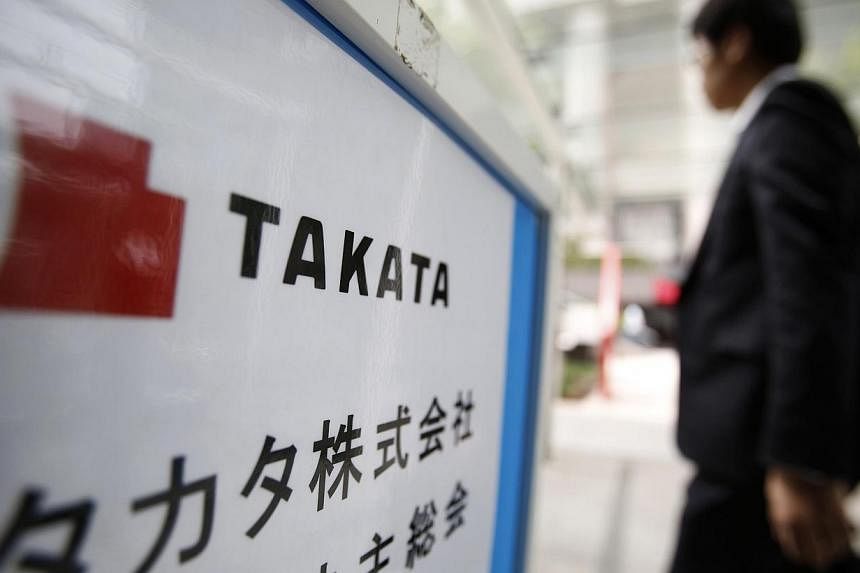TOKYO (AFP) - Japanese auto parts maker Takata on Thursday rejected a high-profile report that claimed it had covered up the results of tests on faulty airbags linked to as many as five driver deaths.
Quoting former Takata employees, the New York Times reported last week that tests were conducted a decade ago, but executives ordered the destruction of data that exposed design flaws.
On Thursday, Takata said tests were carried out on an airbag part that was unrelated to the inflator mechanism at the centre of a mounting crisis.
"Our company did not carry out such test (on inflators) in 2004, and we absolutely did not cover-up test results, as reported in the story," Takata said in a statement.
"This was not a 'secret' test...The story is based on an inaccurate understanding of the facts, and it defames our firm and employees."
The denial came as Takata customer Honda announced an additional recall of more than 170,000 vehicles worldwide due to the risk that an explosion could send metal shards from the airbag's inflator hurtling at drivers.
Millions of vehicles produced by some of the world's biggest automakers, including Honda, Toyota and General Motors, have been recalled over the problem.
Takata's strongly worded statement was in sharp contrast to its largely silent response to the scandal.
Its chairman has said little publicly, and top executives were not present at a press briefing when the company warned last week of a bigger-than-expected annual loss.
Takata is facing lawsuits, calls for a criminal probe, and accusations of "deception and obfuscation" over the potentially deadly defect.
Honda - which has also been named in a US lawsuit that alleges it conspired with Takata to hide the flaw for years - said an exploding airbag in one of its cars killed a woman in Malaysia, bringing to five the number of airbag-linked deaths.
The previous four deaths happened in the United States.
"An airbag on one of our vehicles exploded abnormally and a Malaysian woman was killed (in July)," said a Tokyo-based spokesman for the Civic and Accord maker.
At least three of the five deaths "were caused by an abnormal airbag explosion, including the latest case in Malaysia", Honda said, adding the cause in the other two cases had yet to be confirmed.
Police reportedly investigated at least one driver death in the US as a murder due to woman's grisly injuries, until their focus switched to the vehicle's airbag.
Responding to Honda's announcement Thursday, Takata chairman Shigehisa Takada offered his "sincere condolences" in the Malaysia death.
"I also deeply apologise to users of our firm's products, business clients, shareholders and others," he said in a statement.
"We will fully cooperate with this recall and we will strengthen our quality control to prevent similar incidents." Takata's shares have lost about half their value since an investigation was opened this summer.
Attention has focused on a Takata plant in Mexico, with suspicions the defect may be linked to a chemical propellant used to inflate the airbags which can more easily rupture in areas with high humidity.
Takata said Thursday it had changed the chemical makeup of its airbag propellants, but insisted it was not linked to design flaws.
"We constantly update our products - it has nothing to do with the recalls," a Takata spokesman told AFP.
Founded in 1933 as a textile company, Takata evolved into an automotive parts giant that started selling airbags in the 1980s and now has dozens of plants and offices in 20 countries, including the United States, China and Mexico.
The airbag division accounts for about 40 percent of its total revenue, which amounted to 556.99 billion yen (S$6.22 billion) last fiscal year.
Major automakers have shied away from discussing their future relationship with Takata, but a quick switch is unlikely given the Japanese giant's foothold in the sector.

